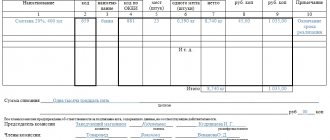Employers often provide comfortable working conditions for employees by creating food establishments, such as canteens, or organizing meals by concluding an agreement to deliver lunches to the office. In this regard, it is necessary to clearly define the procedure for providing food, its types and legal features: In what cases is the employer obliged to provide food? How to document employee meals? What taxes will be associated with the provision of free food to employees? How to reflect employee meals in accounting entries?
Meals for employees of an organization can be provided both in accordance with legal requirements and at the initiative of the employer. In the latter case, free food is one of the components of the social package offered to the company's employees. Therefore, before talking about the process of organizing the provision of food, it is necessary to understand what type of food this is.
"Reimbursement" of meals for employees of the organization
The head of the organization may decide to fully or partially pay the cost of food (payment of compensation for the cost of food).
Providing free lunches
Providing free food is possible for three main reasons:
- In accordance with current legislation (for example, at work with hazardous working conditions in accordance with Article 222 of the Labor Code of the Russian Federation).
- In accordance with the conditions stipulated by employment agreements (contracts) and (or) collective agreements.
- By decision of the head of the organization.
Regulatory legal acts of the Ministry of Health of Russia and the Ministry of Labor of Russia define lists of professions that provide for the provision of free food and its norms, as well as criteria for harmful working conditions. Considering that these payments are recognized as compensation payments, they are not subject to contributions for compulsory pension insurance, unified social tax and personal income tax. Expenses for providing employees with free food and products in accordance with the legislation of the Russian Federation are taken into account for tax purposes as part of labor costs on the basis of paragraph 4 of Article 255 of the Tax Code of the Russian Federation.
However, for most organizations, the current legislation does not provide free meals to employees. Therefore, consideration of the taxation procedure in the last two cases is the most relevant.
Expenses for tax purposes are taken into account subject to the conditions of their validity and documentary evidence. In accordance with paragraph 25 of Article 270 of the Tax Code of the Russian Federation, expenses associated with the provision of free or reduced-price meals can be taken into account for profit tax purposes if these conditions are provided for in employment agreements (contracts) and (or) collective agreements. Otherwise, accounting for these expenses for the purposes of calculating income tax is unjustified.
According to paragraph 1 of Article 237 of the Tax Code of the Russian Federation, the tax base for calculating the unified social tax includes payments and other remuneration, regardless of the form in which they are made, intended for an individual - an employee or members of his family. Such other payments include, in particular, payment of the cost of food for employees in the office, costs of purchasing drinking water and drinks for employees. Consequently, the need to calculate and pay contributions to compulsory pension insurance and unified social tax in this case is beyond doubt. This position is confirmed by letter of the Ministry of Finance of Russia dated February 20, 2002 No. 04-04-04/24.
When providing free food by decision (order) of the manager, these expenses cannot reduce the tax base for profit. Consequently, in accordance with paragraph 3 of Article 236 of the Tax Code of the Russian Federation, these amounts are not taken into account when calculating contributions to compulsory social security and unified social tax.
It is important to remember that according to paragraph 3 of the Information Letter of the Presidium of the Supreme Arbitration Court of the Russian Federation dated March 14, 2006 No. 106 “Review of the practice of consideration by arbitration courts of cases related to the collection of the unified social tax,” when considering cases concerning the correct determination of the tax base under the Unified Social Tax, it is necessary to keep in mind, that paragraph 3 of Article 236 of the Tax Code of the Russian Federation does not provide the taxpayer with the right to choose which tax (UST or income tax) to reduce the tax base by the amount of the corresponding payments.
In some cases, providing free meals by decision of the manager is more profitable, since contributions to compulsory pension insurance and unified social tax are not charged on the cost of food.
According to paragraph 2 of Article 211 of the Tax Code of the Russian Federation, the provision of free food is an employee’s income received in kind. Thus, personal income tax is also subject to calculation and payment by the tax agent, i.e., the employer, regardless of the method of organizing meals (ordering lunch at the office, paying for meals at the nearest cafe).
At the same time, calculating an employee’s income is extremely difficult if the employee is provided with food in “uncertain amounts” (for example, when organizing meals in the form of a “buffet”). Paragraph 8 of the information letter of the Supreme Arbitration Court of the Russian Federation dated June 21, 1999 No. 42 stipulates that income in the form of a material benefit is subject to inclusion in the total income of an individual if the amount of income can be determined in relation to a specific individual. This norm is still relevant today.
In this regard, the Resolution of the Federal Antimonopoly Service of the North-Western District dated November 1, 2006 in case No. A56-2227/2006 is of interest.
Tax authority specialists, in the absence of “personification” of the amount of income received in kind (meals provided free of charge to employees), calculated personal income tax amounts based on the number of days worked by each employee in a calendar month and the average cost of lunch in canteens at organizations in St. Petersburg. This calculation was found by the court to be unfounded, because Firstly,
Based on the foregoing, the court concluded that the tax authority does not have legal grounds for assessing additional personal income tax on these incomes and bringing the Company to tax liability under Article 123 of the Tax Code of the Russian Federation.Providing lunches at reduced pricesIf lunches are sold to employees at reduced prices, problems with taxation are also unlikely to be avoided. In accordance with paragraph 2 of Article 20 of the Tax Code of the Russian Federation, the court may recognize persons as interdependent on other grounds not specified in paragraph 1 of this article. In particular, the court may recognize an organization and its employees as interdependent persons. The norms of Article 40 of the Tax Code of the Russian Federation provide for the right of tax authorities to exercise control over the correct application of prices for transactions, including in relation to sold public catering products. If the tax authority can prove the interdependence of the organization and its employees, as well as determine market prices for the products sold, additional income tax and value added tax may be assessed in relation to the organization’s activities in the sale of public catering products, and in relation to employees - tax on the income of individuals. Payment of compensationExpenses for payment of compensation for the cost of food may reduce the taxable base for profit in accordance with the provisions of Article 255 and paragraph 25 of Article 270 of the Tax Code of the Russian Federation only on the condition that the right to receive the specified compensation, as well as its amount, are provided for in labor (collective) agreements. Accordingly, given that these amounts increase the employee’s income, the calculation of contributions to compulsory pension insurance, unified social tax and personal income tax is mandatory. If compensation or its amount is not specified in the employment (collective) agreement, these expenses cannot be taken into account for profit tax purposes. Also, contributions to compulsory pension insurance and unified social tax are not calculated from these amounts. In this regard, the Resolution of the Federal Antimonopoly Service of the Volga-Vyatka District dated 02/07/2007 in case No. A43-5090/2006-16-151 is of interest. The court found that the Company had a collective agreement providing for the payment of compensation for the cost of food at production to each employee working a full-time schedule. The specific amounts of compensation are not determined by the contract. Payment of compensation for the cost of food was made in the amounts established by the orders of the general director of the company. Based on the foregoing, the courts concluded that
|
How to choose a catering company
If management is thinking about organizing catering at an enterprise, then first of all it is necessary to choose a supplier of ready-made lunches. Finding information about catering companies is now not at all difficult, since every serious company providing its services in the market for these services should have its own website. It usually provides the necessary information:
|
Choosing the optimal way to organize meals
When choosing a method for organizing meals for employees, important attention is paid not only to the organizational aspect, but also to the financial one. It’s no secret that “what’s cheap and tasty” is extremely rare. Therefore, to make the right decision, a comprehensive, objective assessment of the various methods of organizing nutrition is important.
Public catering services are understood as the result of enterprises’ activities to satisfy consumer needs for nutrition and leisure activities. These include, in particular, services for the production of culinary products, varied by day of the week, or special food rations for various groups of the population served (canteen food services), as well as for creating conditions for the sale and organization of their consumption at the enterprise (GOST R 50764 -95 “Catering services”).
When carrying out operations in public catering, you should be guided by the “Rules for the provision of public catering services”, approved by Decree of the Government of the Russian Federation of August 15, 1997 No. 1036.
The classification of public catering facilities is approved by the Decree of the State Standard of Russia dated 04/05/1995 No. 198 (GOST R 50762-95 “Public catering. Classification of enterprises”). In accordance with this classification, the main types of public catering facilities are:
- canteen - a public catering establishment that is open to the public or serves a specific group of consumers, producing and selling dishes in accordance with a menu varied by day of the week;
- bar - a catering establishment with a bar counter, selling mixed, strong alcoholic, low-alcohol and non-alcoholic drinks, snacks, desserts, pastry and bakery products, purchased goods;
- cafe is an enterprise that organizes food and recreation for consumers, providing a limited range of products compared to a restaurant. Sells branded, custom-made dishes, products and drinks.
The list of unified forms of primary accounting documentation for recording operations in public catering was approved by Resolution of the State Statistics Committee of Russia dated December 25, 1998 No. 132.
Currently, there are various forms of catering for employees, the main ones are:
- Organization of a catering facility.
- Order lunches for the office.
- Providing premises and equipment for cooking.
Firstly , when organizing meals for employees for a fee, the organization (individual entrepreneur) has an additional type of activity, which imposes additional requirements on both the taxation procedure and accounting.
It must be taken into account that in accordance with Chapter 26.3 of the Tax Code of the Russian Federation and the laws of the constituent entities of the Russian Federation in a number of regions, the implementation of activities related to the provision of public catering services has been transferred to the taxation system in the form of a single tax on imputed income. Article 346.27 of the Tax Code of the Russian Federation establishes that public catering services are understood as services for the production of culinary products and (or) confectionery products, the creation of conditions for the consumption and (or) sale of finished culinary products, confectionery products and (or) purchased goods, as well as for carrying out leisure
Chapter 26.3 of the Tax Code of the Russian Federation provides for the possibility of transferring to the taxation system in the form of a single tax on imputed income activities for the provision of public catering services carried out through public catering facilities with an area of the customer service hall of no more than 150 square meters for each public catering facility, and also not having visitor service halls.
Thus, when a taxation system is introduced in the region in the form of a single tax on imputed income in relation to the provision of public catering services, an organization (individual entrepreneur) is obliged to pay a single tax. Accordingly, the costs associated with the implementation of a new type of activity will need to be taken into account separately.
The Ministry of Finance of Russia in letters dated March 17, 2006. No. 03-11-04/3/141 and dated 06/07/2006 No. 03-11-04/3/283 clarifies that the application of the taxation system in the form of UTII in relation to the provision of public catering services does not depend on the amount of income, derived from the implementation of the specified type of activity, as well as from the status of the consumer, be it an employee of an organization or a “person on the street”. Thus, specialists from the Ministry of Finance of Russia made the following conclusion: “If an organization’s canteen provides food services to its employees for a fee, then this activity is subject to mandatory transfer to the payment of UTII.”
A single tax on imputed income must be paid regardless of the type of public catering facility. For example, the Federal Arbitration Court of the Volga-Vyatka District considered a dispute about the need to pay UTII when staffing a rotational camp with boiler stations to ensure normal working conditions (FAS Resolution of November 22, 2006 in case No. A29-2564/2006a). During the consideration of the case, it was established that the Company purchased food products that were subjected to heat treatment by a cook in boiler stations, i.e. temporary structures in the form of trailers equipped for cooking and eating food). Meals were provided by the employee for a fee (amounts for meals were withheld from the employees' wages). Based on the above, the courts came to the conclusion that “boiler stations are essentially a canteen, and the preparation of food and its sale is a food service. Consequently, this activity is subject to a single tax on imputed income and cannot be included in income tax expenses.”
Secondly , public catering facilities, such as canteens, bars, restaurants can be classified as facilities of service industries and farms, which requires the organization of separate accounting for income tax.
According to subclause 48 of clause 1 of Article 264 of the Tax Code of the Russian Federation, expenses associated with the maintenance of the premises of public catering facilities serving labor collectives (including the amount of accrued depreciation, costs of repairing premises, costs of lighting, heating, water supply, electricity supply, as well as fuel for cooking food) are taken into account as part of other expenses, if such expenses are not taken into account in accordance with Article 275.1 of the Tax Code of the Russian Federation.
Since January 1, 2006, the Tax Code of the Russian Federation has provided for the taxpayer’s obligation to maintain separate tax accounting for divisions carrying out activities related to the use of facilities of service industries and farms, from tax accounting for other types of activities. This article stipulates that service industries and farms include subsidiary farms, housing and communal services, social and cultural spheres, educational courses and other similar farms, production and services that sell services to both their employees and third parties.
The main feature of determining the tax base in accordance with Article 275.1 of the Tax Code of the Russian Federation is the possibility of accounting for losses for tax purposes resulting from the activities of service industries and farms only if a number of conditions are met:
- the cost of goods and services sold by the taxpayer corresponds to the cost of similar services provided by specialized organizations carrying out similar activities;
- the costs of maintaining service facilities and other similar facilities do not exceed the usual costs of servicing similar facilities;
- the conditions for the provision of services do not differ significantly from the conditions for the provision of services by specialized organizations for which this activity is the main activity.
At the same time, among specialists of the Ministry of Finance of Russia there is no consensus on the need to maintain separate accounting for a public catering facility located directly on the territory of the organization, and tax accounting for profits in the main type of activity of the organization.
For example, in the letter of the Ministry of Finance of Russia dated September 22, 2006 No. 03-03-04/1/669 it is explained that cafes and bars can be classified as objects recognized as service industries and farms, and, therefore, tax accounting for their activities must be kept separately.
At the same time, from the letter of the Ministry of Finance of Russia dated September 05, 2006 No. 03-03-04/1/652, it does not follow that it is necessary to maintain separate accounting for the costs of maintaining a canteen located on the territory of the organization and serving plant employees. In accordance with the specified letter, expenses associated with the maintenance of the premises of a public catering facility (canteen) are subject to inclusion in other expenses associated with production and sales.
According to the author, if the applicable sales prices for canteen (cafe, bar) products are generally close to the cost of production, and as a result of the activity, a loss on the activities of the specified service facility is not generated, then all costs associated with the maintenance of the catering facility, can be taken into account for tax purposes without any restrictions. As for tax accounting, it should be noted that the Tax Code of the Russian Federation does not provide for fines for violating the tax accounting procedure.
Until January 1, 2006, costs associated with the maintenance of public catering premises serving labor collectives were classified as other costs associated with production and sales. This approach is confirmed by the Resolution of the Federal Antimonopoly Service of the East Siberian District dated September 6, 2006 in case No. A74-1273/2006-F02-4571/06-S1.
Questions about the validity of accounting for tax purposes for the costs of maintaining public catering facilities have repeatedly been the subject of litigation. For example, the legality of accounting for expenses for depreciation of the canteen (Resolution of the Federal Antimonopoly Service of the Central District dated October 12, 2006 in case No. A09-15152/05-12), for the security of the canteen (Resolution of the Federal Antimonopoly Service of the Moscow District dated August 22, 2006 in case No. KA-A40/7640) was confirmed -06).
Equipment for eating areas
However, not all organizations have the opportunity to have a canteen. Some organizational leaders prefer to set up a place for eating. Why do they buy kettles, stoves (microwave ovens), refrigerators and, of course, dishes? The costs of purchasing these items, as a rule, attract increased attention from tax authorities. The most advantageous situations are those organizations that can prove that “without boiled water, the entire production process will stop, and a refrigerator is necessary for storing reagents.”
Others should rely on the “kindness” of the inspector or go to defend the validity of the expenses incurred in court.
To confirm the legality of attributing expenses for equipping a room for meals, it is necessary to prove the validity of the expenses incurred. In accordance with subparagraph 7 of paragraph 1 of Article 264 of the Tax Code of the Russian Federation, expenses that reduce the tax base include expenses to ensure normal working conditions and safety measures. In accordance with Articles 22, 223 of the Labor Code of the Russian Federation, the employer is obliged to ensure labor safety and conditions that meet the requirements of occupational safety and health, and to provide sanitary, drinking and medical services for its employees. Similar requirements are provided for by the Law of the Russian Federation of July 17, 1999 No. 181-FZ “On the Fundamentals of Labor Safety.”
As practice shows, when confirming the reasonableness of the costs of equipping a premises for eating, the courts take into account the employer’s obligation to provide its employees with normal working conditions. This circumstance is decisive when the court makes a decision in favor of taxpayers.
For example, when considering the cassation appeal of an OJSC (Resolution of the Federal Antimonopoly Service of the North-Western District dated April 21, 2006 in case No. A56-7747/2005), the court found that the organization has divisions with round-the-clock operation and the collective agreement stipulates the company’s obligation to provide workers with hot meals and drinking water. Taking into account these circumstances, the court came to the conclusion that “electric kettles, coffee makers, microwave ovens and refrigerators are also necessary to create normal working conditions for workers.”
The resolution of the Federal Antimonopoly Service of the North-Western District dated December 26, 2005 in case No. A44-2051/2005-9 confirmed the validity of the costs of purchasing electrical appliances (refrigerators, water heaters, kettles) in order to ensure proper work and rest for workers engaged in continuous production, and Resolution of the Federal Antimonopoly Service of the Central District dated August 31, 2005 in case No. A09-18881/04-12 - on the purchase of a microwave oven in order to ensure normal working conditions.
In fairness, it should be noted that in some cases the courts may not recognize the costs of purchasing household electrical appliances as necessary for the organization’s production activities. For example, in the Resolution of the Federal Antimonopoly Service of the Moscow District dated November 10, 2005 in case No. KA-A40/10783-05, the court concluded that “the costs of purchasing washing machines, refrigerators, vacuum cleaners, irons, electric stoves, curtains, televisions, VCRs, heaters, carpets , video cameras, plants, kitchen units, sinks, microwave ovens, tea and table sets do not belong to production activities.”
Delicious food is the key to great work
Owners of small and medium-sized businesses have begun to treat their employees more carefully, perhaps not only out of philanthropy.
The economic effect of well-functioning corporate catering in Moscow has already been calculated. It has been established that ordering ready-made meals from a catering company is much more profitable than organizing the dining rooms yourself. People who eat normal food, rather than fast food and sandwiches, get sick less often and are in better physical and intellectual shape, therefore, their ability to work is higher. Take care of your employees, and in return they will help your business prosper.
Providing drinking water
One of the pressing issues that arise in the activities of most organizations is the justification for the attribution of expenses for the purchase of drinking water and coolers.
According to the author, the main factor in proving the validity of expenses for the purchase of drinking water is the need to ensure normal working conditions.
For example, during the consideration of the case (Resolution of the Federal Antimonopoly Service of the West Siberian District dated January 31, 2007 No. F04-9283/2006 (30504-A45-33) it was established that clean drinking water was purchased by the company for workers in order to ensure normal working conditions and technical measures safety. Taking into account this circumstance, the court came to the conclusion that it was legal to include the cost of drinking water and a cooler as expenses. The judges came to a similar conclusion when considering the issue of the validity of the costs of drinking water purchased by the landlord in order to ensure “normal and healthy working conditions” during leasing of workplaces (Resolution of the Federal Antimonopoly Service of the Moscow District dated September 11, 2006 in case No. KA-A40/8421-06).
In the letter of the Ministry of Finance of Russia dated December 2, 2005 No. 03-03-04/1/408 it is explained that expenses for the purchase of drinking water and rental of a cooler can be taken into account in reducing the amount of income received by the enterprise when calculating the tax base for income tax, only in the case if, according to the conclusion of the sanitary-epidemiological service, the water in the water supply is not suitable for drinking. Drinking water standards are established by Sanitary and Epidemiological Rules and Norms 2.1.4.1074-01 “Drinking Water. Hygienic requirements for water quality in centralized water supply systems. Quality control" (approved on September 26, 2001).
However, in some cases it will be necessary to prove the validity of attributing expenses in court, since tax specialists do not always adhere to the position that drinking water expenses are legally recognized for tax purposes. For example, in the letter of the Department of the Ministry of Taxes and Taxes of the Russian Federation for Moscow dated September 29, 2003 No. 26-12/54118 it is explained
| Problems with calculating personal income tax and unified social tax should not arise, since organizing personalized accounting of drinking water consumption is not possible. |







